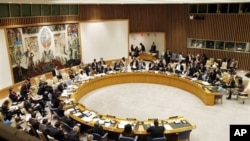At the United Nations, Britain and France have been drawing up a draft Security Council resolution on a No-Fly Zone over Libya. While diplomats say nothing formal has been circulated yet, talks are going on behind the scenes among council members.
British diplomats say their work on a possible No-Fly Zone resolution is a contingency plan as they prepare for all eventualities in Libya, where anti-government fighters are locked in a bloody battle with forces loyal to leader Moammar Gadhafi.
On Tuesday, the U.N. Security Council was briefed in private by the U.N.’s top political official, Lynn Pascoe, who just returned from the region. He spoke to reporters after the session.
"I think all of us have been watching the situation there with great concern. As we see the battles that have been going on; the difficulties people have getting out at the moment, out of the way; the clear actions that are being taken against the people there, both in Tripoli and the fights in other cities. This is a matter of huge concern I think for all of us in the secretariat, certainly for the Security Council," he said.
Asked if the Secretary-General would support a No-Fly Zone, Pascoe said it is a decision for the Security Council, not the U.N. chief.
But a resolution setting up a zone of airspace in which certain aircraft, especially military ones, are forbidden to fly may have trouble getting off the ground in the 15-member Security Council.
Veto-wielding members Russia and China traditionally do not like interfering in the internal matters of other countries and may have serious reservations about endorsing such a measure. There has been mixed support in the United States for the idea, with some in Congress calling for it and others saying it would be too hard to implement.
Even the two countries drafting the resolution say there would have to be very specific triggers for them to put the resolution before the council for a vote, such as massacres of civilians or some other form of grave and systematic human rights violations.
India’s U.N. Ambassador Hardeep Singh Puri, who is among the non-permanent members of the council, said such a measure would also require regional support.
"You would not only need Arab League support, you would need to find out what the views of the African Union are. You know [UN resolution] 1970 is just a few days old. You would want to see 1970 fully implemented and you would want to see what the countries in the region - how they are viewing the situation - then the council would have a considered view," Singh Puri said.
Germany’s Ambassador Peter Wittig said his government would like to see the political pressure turned up on the Gadhafi government with further sanctions that go beyond the travel ban, asset freeze, arms embargo and referral to the International Criminal Court that the Security Council authorized late last month. He added that the council discussed other measures going beyond sanctions, but said those talks are at "a very early stage"”
Council diplomats say no formal draft resolution has been circulated and there is no specific timetable to do so. All further action in the council will largely depend on how the situation evolves on the ground in Libya.
Libya No-Fly Zone Discussed at UN Security Council




